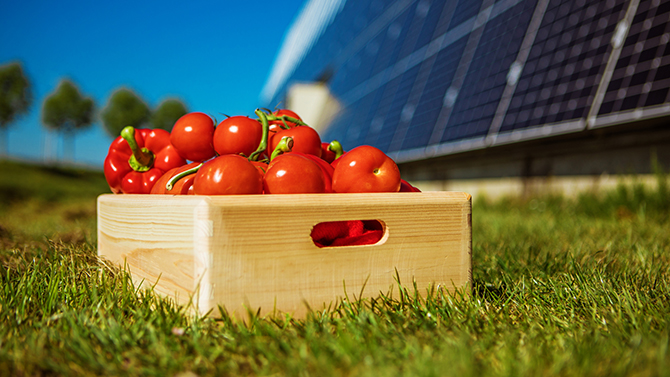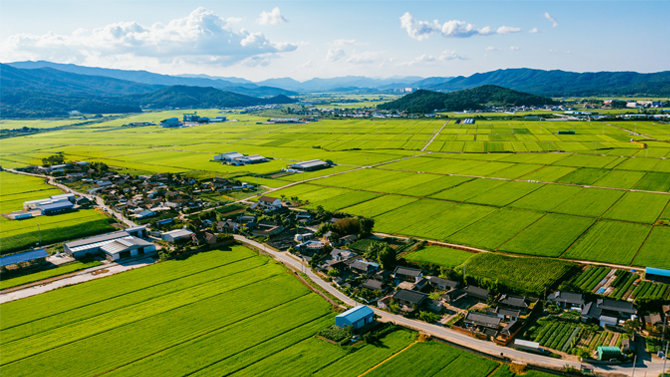Social Issues addressed by Sumitomo —Compass for the Future—
Demonstration experiments for every phase of the food chain from production to consumption aimed at reducing household food waste
 Food loss and waste
Food loss and wasteWho is wasting this mountain of food? Is it businesses, such as food manufacturers, retailers, and restaurants, or consumers who throw away food in their household trash? According to the estimates for fiscal 2019 of the Ministry of Agriculture, Forestry and Fisheries and the Ministry of the Environment, of a total of 5.7 million tons of food as lost or wasted in Japan that year, 3.09 million tons was attributable to businesses and 2.61 million tons to households, a roughly, 50:50 split. So, since the efforts of either businesses or consumers alone would not amount to a definitive solution to the problem of food loss and waste, their cooperation on this issue is indispensable.
Nevertheless, as consumers’ voluntary initiatives are unlikely to get to the heart of the problem and dramatically reduce food loss and waste, businesses need to take the lead. It is incumbent on companies to offer products and services whose purchase and use by consumers lead to reduced food loss and waste. The Japan Research Institute (JRI) conducted demonstration experiments from January to February 2022 as an activity of the Smart Food Consumption (SFC) Concept Study Group established in 2019.
JRI established the SFC Concept Study Group to examine services and business models for optimizing food consumption, focusing on reduction of household food waste, a factor to which companies previously paid little attention. Various businesses are participating in this study group. The idea is to substantially reduce food loss and waste by optimizing the entire supply chain, starting with consumers.
In its first year, fiscal 2019, the SFC Concept Study Group held discussions by participating companies, and conducted a survey, workshops, etc. In fiscal 2020, the Study Group conducted demonstration experiments as part of a project commissioned by the Ministry of Economy, Trade and Industry (METI). In this project, electronic tags were used to track fresh produce on distribution routes from producers to an online supermarket and to consumers’ homes. The impacts of “visualization” of freshness and dynamic pricing on reduction of food loss and waste were examined.
Further demonstration experiments were conducted in fiscal 2021, also as part of a project commissioned by METI, to further deepen the knowledge gained in the previous year. Besides JRI, other members of the SFC Concept Study Group, namely, Ito-Yokado, Imamura Shoji, SATO, SIRUTASU, Toppan, and Hitachi Solutions West Japan, conducted the experiments. Whereas the experiments in fiscal 2020 were for the entire food chain, those in fiscal 2021 delved deeper and corresponded to the three segments of the food chain: 1) from producers to retailers, 2) retailers, and 3) from retailers to consumers.

From January 12, 2022 to February 28, 2022, demonstration experiments were conducted in Tokyo corresponding to the three segments of the food chain: 1) from producers to retailers, 2) retailers, and 3) from retailers to consumers.
In the experiment for the first segment “from producers to retailers,” information that producers have but that has hitherto been little utilized, such as information on the conditions of produce at the time of harvesting, is communicated to consumers while tracking produce on distribution routes from producers to a supermarket in Tokyo. The objective is to find out whether providing such information to consumers broadens their selection criteria and is effective in reducing food waste. It is also an attempt to answer a question: Does communicating new value of produce lead to change in consumer behavior.

In the experiment for the second segment “retailers,” dynamic pricing was applied. Using electronic shelf labels at a supermarket, prices changed depending on best-by dates and use-by dates. Greater variation in prices for the same product gives consumers new options in their purchase decisions and is also a way of selling off all the stock. The objective is to verify the impact on enhancement of a store’s operational efficiency as well as on food waste reduction.

In the experiment for the third segment “from retailers to consumers,” based on data on purchasing and data on consumption and disposal, information helpful to consumers in their food purchasing, cooking, and storage is provided to them from the viewpoint of “health.” To “visualize” food stocks, this experiment is designed to encourage consumers to register consumption and disposal data efficiently, economically, and in a fun way. It examines whether consumers can unconsciously help reduce food waste by taking advantage of services they receive.

The results of the experiments in fiscal 2020 convinced the SFC Concept Study Group that providing information on freshness can change consumers’ purchasing behavior. A dynamic pricing experiment and an experiment in which consumers managed food stocks at home also showed positive impacts on reduction of food waste. The SFC Concept Study Group expects the experiments in fiscal 2021 will offer deeper insights through segmentation of the food chain.
In 2020, JRI set up an R&D project team specialized in food. With food tech attracting ever greater attention, food manufacturers and other clients are increasingly turning to JRI for advice related to food. Establishment of this team underlines JRI’s commitment to food-related consulting. The team also spearheads activities of the SFC Concept Study Group.
The team’s activities are informed by the view that changing consumers’ behavior is more important than changing consumers’ awareness of the need to reduce food loss and waste. Consumers who are aware of the need to reduce food loss and waste have already changed their behavior, but in order to resolve the issue, it is necessary to subtly encourage behavioral change among consumers who are unaware of the issue.
From this perspective, the role of companies in introducing mechanisms related to purchase and consumption, including the ways in which products are sold at stores, becomes increasingly important. For example, the experiment for the third segment offers new mechanisms from the viewpoint of “health,” which are also designed to reduce food waste, and are expected to facilitate behavioral change among consumers who are unaware of the issue. On the other hand, in the case of consumers who are already keenly aware of the issue, offering diverse purchasing options through dynamic pricing is likely to result in greater reductions in food waste. All the demonstration experiments share an approach emphasizing behavioral change of consumers through steps taken in each of the three segments of the food chain.
Following the completion of the demonstration experiments in February 2022, the SFC Concept Study Group will perform detailed verification. By offering consulting to clients, JRI will continue its efforts to reduce food loss and waste.


Read about initiatives to achieve a low-carbon society, aiming at net-zero greenhouse gas emissions since these emissions are implicated in global warming.

In view of ongoing globalization and the growing complexity of supply chains, companies need to respond appropriately to issues in supply chains.

The pace of workstyle reform is accelerating as the COVID-19 pandemic has prompted numerous companies to embrace novel ways of working.

For companies, the COVID-19 pandemic has brought the crucial importance of employee health into sharp focus.

Accelerating global warming poses serious business risks. Accordingly, companies need to formulate strategies and implement specific countermeasures from a medium- to long-term perspective.

Spurred by efforts to reduce environmental impacts and in line with increasing social needs, replacement of gasoline-powered vehicles with electric vehicles is accelerating.

Vigorous initiatives are afoot to tackle social issues by revitalizing communities and the interpersonal relationships that bind them together.

Poverty persists in contemporary Japan and the existence of child poverty is a grave concern.

In view of the continuing decline of Japan’s working age population, due to population aging coupled with a low birthrate, development of the next generation is an urgent issue.

The rapid progress in medicine in recent years is largely due to the efforts of not only universities and other research institutions but also of companies to develop cutting-edge technologies.

Numerous initiatives to promote industry and commerce at the regional and community level are underway, involving the use of renewable energy and thus contributing to decarbonization.

One-third of food produced is lost or wasted globally, amounting to about 1.3 billion tons per year. Food loss and waste is a pressing issue in need of a solution.

Companies are addressing a wide range of issues so that people and companies can coexist in harmony with the global environment.

In addition to natural disasters, there are various types of hazards whose nature, incidence and severity are changing with the times. Resilience and flexibility are indispensable in dealing with them.

Read about initiatives to achieve sustainable regional revitalization. The attributes and resources that each region can offer are leveraged to strengthen local economies and overcome the problem of population decline.